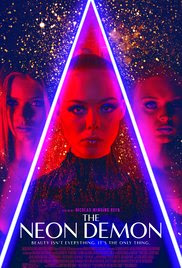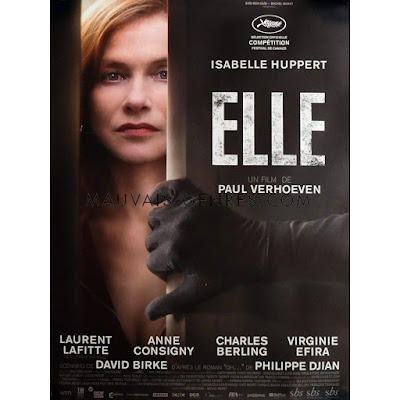Editor’s Note:
Eddie Cockrell's review of Paul Verhoeven’s latest film Elle, his first film in a
decade and his first made in France, brought to attention that the film has been
the subject of much critical controversy. A Facebook post linking up to Eddie’s note on the Film Alert blog caused a most interesting
conversation to take place. I’ve edited the contributions and reposted it for greater enjoyment.
Please note SPOILER ALERT. Peter Hourigan gives away lots of plot points.
Please note SPOILER ALERT. Peter Hourigan gives away lots of plot points.
Peter Hourigan I saw ELLE today - and it's still hammering at me.
I'm not sure that this captures all what I saw. In fact, I'm not sure what I
saw - and this is what's so intriguing. To start - was it a rape? That's a big
question - but perhaps it was part of an ongoing SM relationship between
Huppert and her neighbour. I think there's more than enough evidence for this
to be a possibility. And then, there is also the possibility that much of what
we see is part of Huppert's fantasy - though I think this approach to the film
is more problematic. And is the film exploiting rape for entertainment? Or
saying women have fantasies of violent rape? Or is it an examination of a
damaged life - a life damaged as a child? All these possibilities are aspects that
make this a film worthy of lots of focus and discussion. What I'll ultimately
decide about it, I don't know - but how good to have a film that really challenges
a smug complacency to it like this does
Eddie Cockrell You're exactly
right, Peter, this is a deep and complex film. My review, like many others,
skates over the basics and I even mention that the viewer should be allowed to
peel back the layers for themselves. "Still hammering at me" says it
all.
David Hare Saw this in Paris
in June. I must say it did absolutely nothing for me, and I was frankly
surprised to see people responding to la Huppert's part and performance as
something original, rather than a retread of so many other Huppert suffering
roles. As for Verhoeven I prefer the old middlebrow glossy trash Verhoeven of Showgirls and Spetters for all their gaudy bisexual semi soft core porn. This is
a ponderous Verhoeven merely mimicking Haneke (without the wit.) Sorry guys.
Eddie Cockrell That's why they
make different coloured jelly beans, as we used to say in the Reagan years
(without the extraneous "u," of course).
Peter Hourigan David, a few
thoughts (and spoilers coming. People who haven’t seen the film should NOT
proceed.) This is a film where so much is unexpected – not so much events, but
in people’s reactions. It starts with that violent rape, after which Michele
goes about cleaning up the apartment almost detached. What’s wrong with her, we
think. Later she has a Christmas party at which she starts playing with Patrick’s
crotch under the table. Doesn’t she think he may react in a way that will shame
her? Or does she know – because of their secret relationship with its violent
love-making – that he’ll (um) keep it all under the table? At the end, as
Patrick’s wife (now widow) is leaving the neighbourhood she doesn’t seem as
grief-stricken as we’d expect, and actually thanks Michele for giving Patrick
what she couldn’t – real puritanical church mouse that she is. Did she know
about a violent, ongoing relationship between Patrick and Michele? So, Michele
has certainly a complex psychological present. And we know she has a fraught
psychological history – from at least the age of ten when she was close to her
father when he was arrested for a violent mass murder (not serial killer as
sometimes said). He’s still in her life even though he’s been in prison ever
since. And I’ve said nothing about her relationship with her mother! What
happened to her psyche as a result of being in this family?
She’s a woman with strong sexual instincts, and a very public
way of satisfying and controlling them. How much is she a calculating woman in
her relationships – think of when and how she tells her best friend she’s been
having an affair with her friend’s husband? She knows their friendship will
survive. And what questions there are about how she cranks up the pornographic
level in the video games she’s producing. Huppert’s performance with its
insights into the public face and the private interior, the present behaviour
and the small girl’s history is nothing more than miraculous.
There are no clear answers, just lots of possibilities. Think of
the final ‘rape’ and the resulting death. Remember that she arranged so that
got a lift home with Patrick – and she knew her son was in the house. So,
perhaps she knew that the outcome would be as it was - the final making of
Vincent from a milksop into a man! And that mission would seem to have been
accomplished. So, do we have a victim of the worst possible crime against a
person? Or a calculated, calculating, clever, cold-hearted, emotionally dead
but still very sexually alive woman? Ultimately, only the viewer can decide how
they read all this.
 |
| Claire Denis, Les Salauds |






